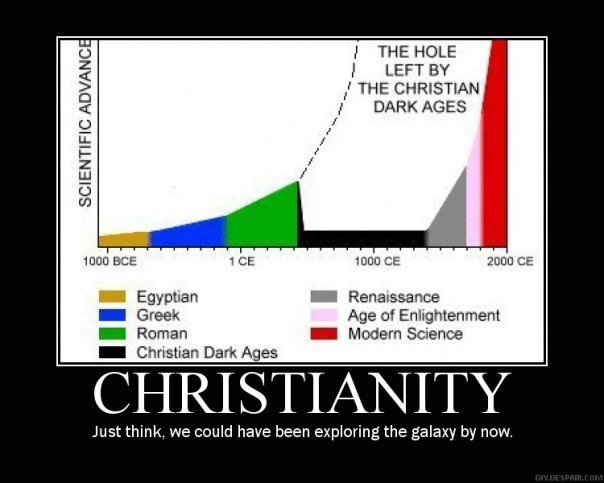This about sums up why I'd rid the world of religion, if I could; stripping people of free will to believe be damned. I'm willing to bet our society and technology would be about 1500 years more advanced by now had there not been the oppression of the church, especially during the Middle Ages... But that's for another topic, I suppose.
Take out, THE CHART!
Ah, such a pretty idea.
Unfortunately, it's also quite wrong.
Case in point, the christian middle ages, the church functioned as a primary promoter, financier, and reviewer of natural philosophy. In addition they preserved many older texts that would otherwise be lost. In every respect the church was a net advantage scientific advancement.
You see what was actually at fault for a net slowdown in advancement in natural philosophy was, the fall of Rome! You see, advancement in natural philosophy and the spread of newly developed technologies is improved by communication between scholars while the spread of inventions is facilitated by the same. This means that if there's a good infrastructure for travel and communication as well as the spread of materials then technology and educational infrastructure. The decline and fall of rome resulted in roads falling into disrepair and infrastructure generally failing. Bandits roamed the roads, economic systems contracted and became balkinized resulting in much smaller potential public works projects.
Italy was one major exception to this because they recovered very quickly, (in major part due to the continued influence of the church who at the time was quite wealthy) which resulted in no long term slowing.
So what's with the galileo affair? The church reviewed his work and found it wanting (again, the church functioned as the natural philosophy reviewer and patron at the time), the fact is that the information of the day was most strongly supportive of the Tychonic system which the church at the time ruled was an acceptable competing system. Heliocentricism had a number of missing critical observations and the same mathematical inconsistencies that the Ptolemaic system (though to a lesser degree). For example the chief criticism of the day as put forward by Tycho himself, was that if the earth did move around the sun then there would be a stellar parallax, which was true. That said it couldn't be observed due to the great distance (which was considered implausible by everyone at the time).
The issues with the Math were not resolved until Kepler's use of Ellipses and the Stellar paralaxes were observed until 1838.
So ultimately he wasn't allowed to teach because the science wasn't there to support his position, yet. His eventual house arrest occurred mostly because he managed to alienate a close friend and supporter (who happened to be the pope) by essentially calling him an idiot. Probably accidentally, but difficult to see any other intent upon initial reading.
So, the Church was, while probably not the most suited organization to shelter scientific advance was the only organization that cared enough to do so and was definitely a net asset. Conflict thesis is pretty roundly rejected by modern historians. The relative lack of advancement in natural philosophy in Western Europe has little to do with the church, and more to do with ability to transfer information, something that was present as the empire began declining as well.
Another issue that led to this perception is the loss of technologies, but the reality is that advances were made laterally. Smaller more balkinized economies meant that giant cities and armies couldn't be supported so technology that explicitly supported the former scale fell into disuse and was lost except that which was preserved in church libraries. Instead technology that was efficient for smaller scale settlements were used.
The fact is that this perception of the so called dark ages was actually just a criticism of literature in the middle ages relative to Roman literature by the scholar Petrarch, but it caught on in popular culture and took on a use to express the middle ages as a period of backwardness when admiration of the Greeks and Romans were popular during the Renaissance. This went to the point that Medieval scholar's works went uncredited even when Renaissance scholars' works were directly based on them.
Not to mention it's a staggeringly eurocentric thesis, while it's certainly true that advancement in the sciences and technology slowed in Western Europe, other areas were advancing. China, the Byzantines, India, and the Muslim world all were advancing at a furious pace. This is true of almost all times, some nations are in a position to advance technologically, others aren't. Western Europe wasn't at the time so it's progress was slowed reletive to better equipped areas.
TL;DR: That impression of the church is an incorrect assumption of the Church's role during that period that has been roundly dismissed and the entire thesis ignores the contributions of other areas during the period.


